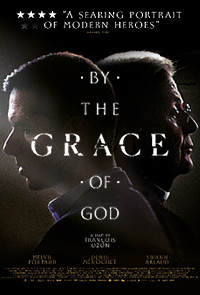| SHADOWS ON THE WALL | REVIEWS | NEWS | FESTIVAL | AWARDS | Q&A | ABOUT | TALKBACK | |||||||||||||||||||||
 Shadows off the beaten path Shadows off the beaten pathIndies, foreigns, docs, revivals and shorts...
On this page:
ASTERIX: THE SECRET OF THE MAGIC POTION |
BY THE GRACE OF GOD |
ROJO
| |||||||||||||||||||||
| See also: SHADOWS FILM FESTIVAL | Last update 2.Sep.19 | |||||||||||||||||||||
|
Astérix: The Secret of the Magic Potion Le Secret de la Potion Magique Review by Rich Cline | 
| |||||||||||||||||||||
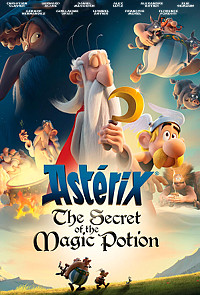 dir-scr Alexandre Astier, Louis Clichy prd Philippe Bony voices Christian Clavier, Guillaume Briat, Bernard Alane, Levanah Solomon, Daniel Mesguich, Serge Papagalli, Francois Morel, Philippe Morier-Genoud English voices Ken Kramer, C Ernst Harth, John Innes, Fleur Delahunty, Michael Shepherd, Don Brown, Jason Simpson, Mark Oliver release Fr 5.Dec.18, US 28.Jun.19, UK 30.Aug.19 18/France 1h27 |
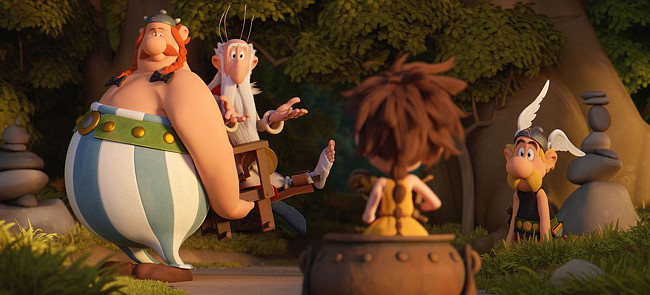 With sharp imagery and a layered, witty script, this French animated romp mirrors the quality of Hollywood studios. Continuing the adventures of those rapscallion Gauls, the English dub is hilariously silly, with nonstop visual and verbal gags, most of which are genuinely funny. There's not much to it otherwise, and it's somehow refreshing that there's no pushy message. It's just a slice of joy. With the Romans ruling Europe, a tiny village in Brittany holds out because its druid Getafix (Innes) has created a magical strength potion, deployed to maximum effect by the community's defender Asterix (Kramer) and his enormous oaf sidekick Obelix (Harth). But Getafix knows he needs to pass his recipe on to a successor, so they set out on an elaborate search. And the intrepid teen girl Pectin (Delahunty) stows away on their journey. Meanwhile, rogue druid Demonix (Shepherd) wants the recipe so he can sell it to Caesar (Oliver) for a profit. The animation design plays on both the vintage comics and the live-action movies. T technical quality is above-average, with direction that makes the most of the key sequences, and imagery that catches the eye with sharp colours and textures. Meanwhile, the script is gleefully corny, using wordplay and nutty characterisations to liven up the uncomplicated plot. So the big climactic finale is both another enormous action cliche and a pastiche of them. The characters are fairly simplistic, but each has a distinct personality that makes him or her likeable. Getafix is the most intriguing, as he grapples with his own destiny while trying to pass on his legacy. This isn't terribly deep stuff, but it plays out in an enjoyable (and not entirely unpredictable) way. So even though Asterix and Obelix are still the central heroes, they're kind of sidelined through much of the narrative, which isn't a problem at all. The Asterix comics first appeared in 1959, and these characters have a global fanbase stretching over a few generations. And these animated films are smartly adapting the franchise for young audiences (this is the third in this style). So with all those comics to choose from, it's a bit odd that the filmmakers decided to write an original story here, something that shows in its structural and thematic simplicity. But it's such gleefully ridiculous fun that it's impossible to mind too much.
| ||||||||||||||||||||
|
By the Grace of God Grâce à Dieu Review by Rich Cline |  MUST
MUST  SEE SEE
BERLIN FILM FEST 
| 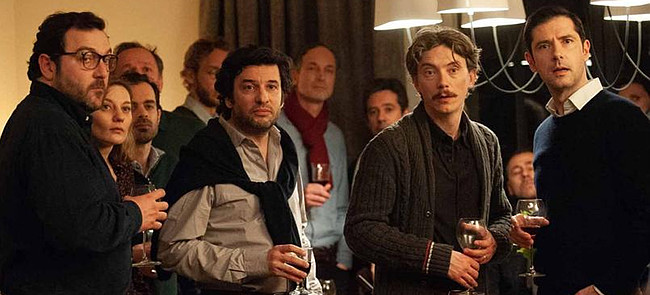 Filmmaker Francois Ozon shifts gears again for this epic fact-based drama. Taking an almost documentary approach with earthy characters and situations, the film barely pauses to catch breath over its long running time. Focussing on now-adult victims of childhood abuse from a priest, the film is timely, urgent and powerfully moving as, like its central characters, it seeks to "lift the burden of silence". With five children, Alexandre (Poupaud) finally decides to confront the Catholic Church about being abused as a young boy by Father Bernard (Verley), who never denies the charge. Lyon's Cardinal Barbarin (Marthouret) is apologetic, but Alexandre is concerned that there's no legal imperative due to the statute of limitations. When fellow victim Francois (Menochet) hears about the police case, he joins the cause, organising a movement with Gilles (Caravaca). This catches the attention of Emmanuel (Arlaud), whose life has been derailed by his childhood abuse, and he adds his more-recent testimony to the file. There's a sense of momentum as the film's narrative shifts from Alexandre's one-man crusade to Francois' more organised campaign, which is further strengthened by Emmanuel's participation. Each of these men had different experiences as boys, with unique repercussions. So working on this cause helps each of them in distinct ways. There's added support from their partners and parents, each of whom has his or her own story relating to what happened to the men when they were kids. Performances are utterly transparent. Poupaud quietly portrays a successful banker with a happy, strikingly open family. But he's also a devout Catholic, which fuels his deeper struggle. Menochet is an avowed atheist who has rejected the Church, which clears his mind even as issues continue to churn relating to his parents (Vincent and Chattot). And Arlaud brings a remarkably raw quality to Emmanuel, who is in a toxic relationship even as his mother (the wonderful Balasko) offers some stability. His transformation from lost to found is beautifully nuanced. Not only is this film right up-to-date (court cases are ongoing), but Ozon has cleverly woven together these stories about real people into a narrative that has a driving but never strident sense of urgent, righteous anger. Yes, it's a long and very wordy movie, as dense dialog is interwoven with voiceovers reading out extended correspondence. But the legal issues are powerfully gripping, the flashbacks are evocative without being salacious, and the story's emotional moments are wrenching in all the right ways.
|
| Rojo Review by Rich Cline | 
| 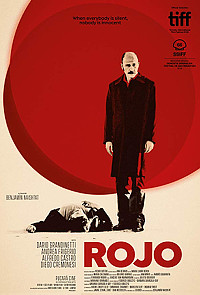 dir-scr Benjamin Naishtat prd Barbara Sarasola-Day, Federico Eibuszyc with Dario Grandinetti, Andrea Frigerio, Alfredo Castro, Claudio Martinez Bel, Diego Cremonesi, Laura Grandinetti, Susana Pampin, Rafael Federman, Rudy Chernicoff, Mara Bestelli, Pierre Marquille, Fabiana Uria release Arg 26.Oct.18, US 12.Jul.19, UK 6.Sep.19 18/Argentina 1h50 TORONTO FILM FEST
| 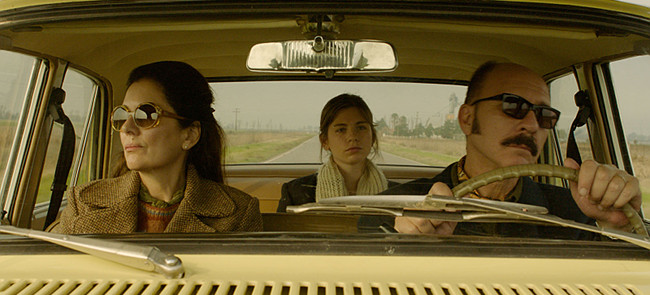 Set in Argentina just a few months before the right-wing coup in 1976, this period drama quickly gets under the skin thanks to writer-director Benjamin Naishtat stylishly intimate storytelling and understated performances from the cast. It's all a bit elusive, only hinting at the big issues and interconnected plot threads, but the writing is fiendishly sharp, packed with bracing observations and underlying menace. In 1975, respected small-town lawyer Claudio (Grandinetti) quietly calls out and humiliates an ill-mannered man (Cremonesi) in a restaurant. Later, the stranger wildly confronts Claudio and his wife Susana (Frigerio), an encounter that becomes unnervingly nasty. Months later, Claudio and his friend Vivas (Bel) are trying to illicitly buy a house abandoned in haste by occupants who fell afoul of the government, then looted by neighbours. But Vivas's brother-in-law has gone missing. Afraid to tell the cops, he hires famed Chilean detective Sinclair (Castro) to investigate. And he immediately zeroes in on Claudio. While this central plot pushes Claudio out of his calmly controlled life, there are other layers of narrative as well, including Claudio and Susana's dance-student daughter Paula (Grandinetti's real daughter Laura) and her entitled boyfriend (Federman), who lashes out with misplaced jealously. And a group of visiting American cowboys is being shamelessly used to bolster support for local politicians. The common thread here connects to the thousands of people who disappeared during this period, rattling the privileged bourgeois as well as the dejected lower classes. Each actor plays beautifully with moments that bristle with subtext. All of these people are living in fear but pretending that life is going on as normal. Grandinetti is excellent as a man who is always composed, even as things close in on him. Watching him squirm is fascinating, especially in the presence of the wonderful Castro, who adds all kinds of subtly quirky flourishes to his role. Each actor finds textures in his or her scenes, keeping pungent emotions only just visible as they churn beneath the surface. The disappearance theme extends to a magician (Chernicoff) who loses a lady during a trick, and the sun itself even briefly vanishes during an eclipse that plunges everything into the titular red. The potent connection here is to the absence of morality and justice in a society where people are afraid to do the right thing. Mix this with human nature and the instinct for self-preservation, and it's easy to see that Naishtat isn't just commenting on his own national history.
| 
See also: SHADOWS FILM FESTIVAL © 2019 by Rich Cline, Shadows
on the Wall
HOME | REVIEWS | NEWS | FESTIVAL | AWARDS
| Q&A | ABOUT | TALKBACK | | ||||||||||||||

